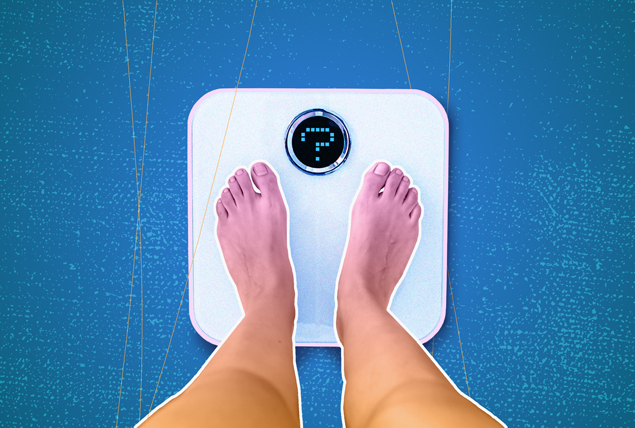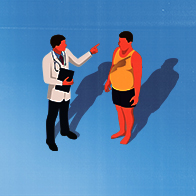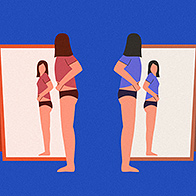How Much of a Woman's Health Depends on Their Weight?

In a world of almond moms, heroin chic's comeback, and Kardashian-endorsed body dysmorphia, it's hard to navigate what actually measures a healthy body. We've been told weight is just a number on a scale, but for women's ever-changing bodies, this doesn't always add up.
As we work towards becoming less fat-phobic and more inclusive, talking heads on social media debate what a healthy weight is.
Instead of listening to another one of Candace Owens' Twitter rants, let's see what licensed medical professionals have to say about how women should be measuring their body's health.
What's the problem with a universal 'healthy weight?'
The concept of healthy body weight is outdated. It typically refers to 1970s' standards where a non validated measurement tool called the Hamwi method was used to estimate the ideal body weight based on height.
"The problem with this method is it is not validated scientifically, it is outdated and it does not account for muscle mass versus fat mass or the age of the person," Kim Ross, M.S., M.B.A., doctor of clinical nutrition and certified nutrition specialist at Adjunct Faculty-Sonoran University of Health Sciences in Lakewood Ranch, Florida, explained.
'A healthy weight for one person may not be the same for another.'
"The problem with coming up with a healthy weight for all people is that individuals have unique body compositions, metabolism and health needs that cannot be easily generalized, said Randa Jaafar, M.D., pain management physician and C.E.O. at FILD Studio in New York City.
"Considering this, a healthy weight for one person may not be the same for another. It's very important to focus on your personal, overall health and lifestyle habits rather than solely relying on weight as a measure of health," Jaafar finished.
"Unrealistic beauty ideals, social pressure and media influence can all impact women's perception of their own bodies and what is considered a healthy weight. This can lead to body dissatisfaction and unhealthy behaviors," Johna Burdeos. R.D., a dietician in Houston, Texas, warned.
How are women's bodies always changing?
Women's bodies and weight fluctuate drastically throughout their lives due to hormonal changes from puberty, menstruation, pregnancy and menopause, Burdeos said. For example, women commonly report weight gain during perimenopause, despite keeping the same diet and activity.
Perimenopausal weight gain is likely caused by the decrease of estrogen, progesterone and testosterone, which happens in this stage of life. Women with PCOS also experience an imbalance of these hormones as well as dysregulation of glucose and insulin, which leads to weight gain, Ross explained.
"It's normal for an adult woman's body to change in each stage of life as she responds to her unique stressors, medical history and lifestyle changes. The biggest factors that influence weight gain over time are decreased activity, taking in more food and calories, stress factors and hormonal shifts as we age," Caroline Thomason, R.D., CDCES, Virginia-based dietitian, said.
How should women's health be measured?
"Health is not exactly something you can see on the scale. Health can be determined by lab work, vital signs like heart rate and blood pressure and physical fitness levels. You can't look at somebody's body and determine whether or not they are healthy with your eyeballs, so often we make this assumption without digging deeper into more tangible health data," Thomason added.
To more accurately determine your health, you should have yearly physical exams and routine lab work. Pay attention to your metabolic and lipid panels, cholesterol and blood sugar tests to help determine your bodily needs.
Schedule important women's health screenings, such as cervical screening and mammograms according to your doctor's recommendations.
"I also believe it is important for women to listen to their bodies. We know our body better than anyone. If you suspect something is not quite right or you just are not feeling the same way, get it checked out," Ross advised.
Health is so much more than your physical well-being. Your mental health is also a key factor in your overall health. You'll want to pay attention to your energy levels and sleep quality, which can be other indicators of how healthy you are, Burdeos suggested.
What are the signs your body is becoming unhealthy?
There are other signs to help you better determine if your health isn't what it could be. These signs include the following, according to Jafaar:
- Having less energy and feeling more tired
- Having a hard time doing physical activities which were previously easy
- Getting sick or getting infections frequently
- Having irregular menstrual cycles or fertility issues
- Getting pain in your joints or having stiffness
- Changes in your skin, such as acne or dryness
"An increase in body fat, especially visceral fat (fat around the abdominal area), can be a sign of unhealthy body size. This can increase the risk of health problems such as diabetes, heart disease and some cancers," Burdeos warned.
"I would like to note that these signs alone do not necessarily indicate an unhealthy body size and consulting with a healthcare professional can provide further insight and guidance," Jaafar advised.
Have a weight talk with your physician to determine if you are at risk of developing health conditions based on your health history. You can get a better idea of your ideal weight and what that looks like for you.
"I recommend all women get regular yearly lab work that includes a metabolic panel, cholesterol and blood sugar. Keeping an eye on these key values is one of the most accurate ways to determine health. If you have unique health struggles, talk to your doctor about getting more extensive lab work," Thomason advised.
The bottom line
Measuring body fat is a small part of the overall picture of your health. While maintaining a healthy weight is important for your health, that involves far more than a BMI calculator. Consider other factors, such as your heart health, muscle mass and your age. Speak with your doctor to learn where you stand.




















